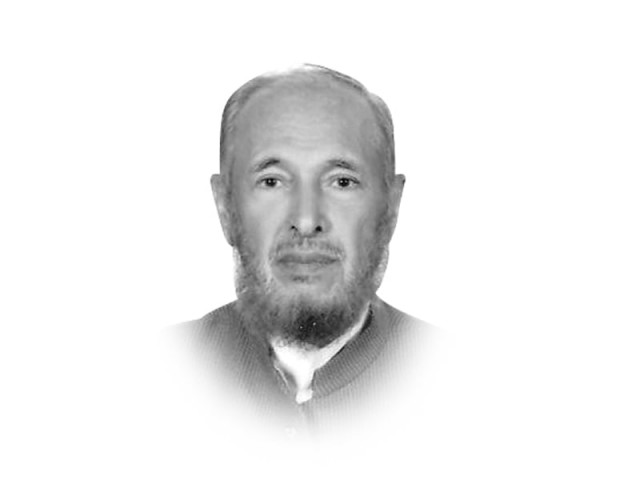Brandishing charlatanry with bravado
The cost of instability will overwhelm the country as Khan has moved ahead with his dream plan of marching

In a time of populist leaders, all attention has been diverted from important issues which are threatening the very existence of mankind to mundane issues that appeal to public sentiment. There is far less emphasis on issues like climate change, depleting water resources, rising sea levels, air and water pollution, population explosion, urban slums, a rise in extremism, growing religious intolerance, rising income inequalities and many more. Populist leaders are more dangerous in less developed countries where the uneducated audiences are easily swayed by bombastic and fiery rhetoric.
In Pakistan we are witnessing this phenomenon as the 230 million people of the country have been held in awe of a well-orchestrated stratagem that claims a ‘US plot’ was hatched to topple Prime Minister Imran Khan from power. The foreign conspiracy narrative was floated just when Khan’s ouster through a no-trust motion in the parliament looked imminent. And right since his removal from power, Khan has launched a blistering campaign against the US, also accusing the establishment of being part of the plot as well as the opposition of being complicit in the ‘sinister’ move. He is also maligning the media for ‘lending support’ to the imaginary conspiracy, and calling for a movement to gain ‘real’ independence. However, none of this was evident during his nearly four years in power.
Surprisingly many people in the country believe in Khan’s theory of US involvement in his removal from power. The rationale is simple: there is deep-seated anger against the US policies in Pakistan like in many other countries. It’s a common belief that no leader can dare stand up against the US for lack of courage and integrity. Defying the US and its policies is considered a noble mission that deserves to be supported. The essence of Khan’s movement is that once in power, things would get back to ‘normal’. No wonder, Khan is receiving a tremendous response from hundreds of thousands of people who wait for hours and hours to listen to him at public meetings held in Khyber-Pakhtunkhwa and Punjab in recent weeks. Gone are the feelings of pain, misery and suffering that people had to endure during his tenure as Prime Minister because of the soaring cost of living, job losses and increase in poverty. No longer are the rank-and-file Pakistanis talking about the skyrocketing inflation and the rising poverty. Now few remember that it was during his tenure that India annexed the disputed Kashmir state. And few are talking about his very dubious ascendance to power through the support of the establishment that he now blames was a party to the plot to remove him.
All these contradictions have been ignored and he has successfully amassed support for his cause of being a victim of a conspiracy. The coalition government led by Prime Minister Shehbaz Sharif is unable to respond with a clear, workable strategy to the unfolding challenges that the PTI poses in the short and medium term. The economy is in a shambles and no real solution is in sight as debt repayment, trade imbalance and chronic budget deficit are insurmountable hazards in the way of putting the economy back on a sustainable trajectory. Political and constitutional problems pose a formidable challenge to the new government. The Supreme Court’s ruling on the defections of parliamentarians belonging to the PTI poses another challenge for the government. It has cast a doubt on the continuation of the existing parliamentary arrangement. Dark clouds are hovering over the political landscape of the country as the future of the current dispensation looks bleak. With the deep scepticism that is now prevalent across the country, the economy is in free fall and has turned the situation further depressing.
The cost of instability will overwhelm the country as Khan has moved ahead with his dream plan of marching on Islamabad. His ‘long march’ simply means that the change, which has been brought about by constitutional means, is not acceptable to him. And that unconstitutional means have been adopted for accomplishing the objective of an early election. The PTI chairman is convinced that an early election would lead to his resounding victory as the claim of being a victim of conspiracy would be accepted enthusiastically by vast multitudes of people.
To his good fortune, no one in the opposition alliance can match the oratory, the vitriolic rhetoric, the mendacious lies that the PTI leader utters with such bravado. This is the opposition’s dilemma. With every passing day, Khan’s juggernaut gathers more speed and momentum. It has been converted into a do-or-die movement. Never in Pakistan’s history has a political movement that rests on such preposterous claims won such overwhelming mass support in such a short time.
The country is on the brink. If the PTI’s long march turns ugly and if there are clashes with law enforcement agencies, the government will be destabilised. In any such eventuality, any government anywhere would be expected to display courage and hold on to its obligations to ensure peace. It must be an unambiguous option no matter what the cost. In Pakistan, however, the ‘political fallout’ takes precedence and compromises are made at the cost of justice and all forms of accountability — which leads to more chaos.
The developing situation is a test of the resolve and determination of the government and its capability of dealing with a crisis, which is meant to accomplish the objective of an early election. The government knows well that conceding here would strengthen PTI’s mass appeal ahead of th
















COMMENTS
Comments are moderated and generally will be posted if they are on-topic and not abusive.
For more information, please see our Comments FAQ